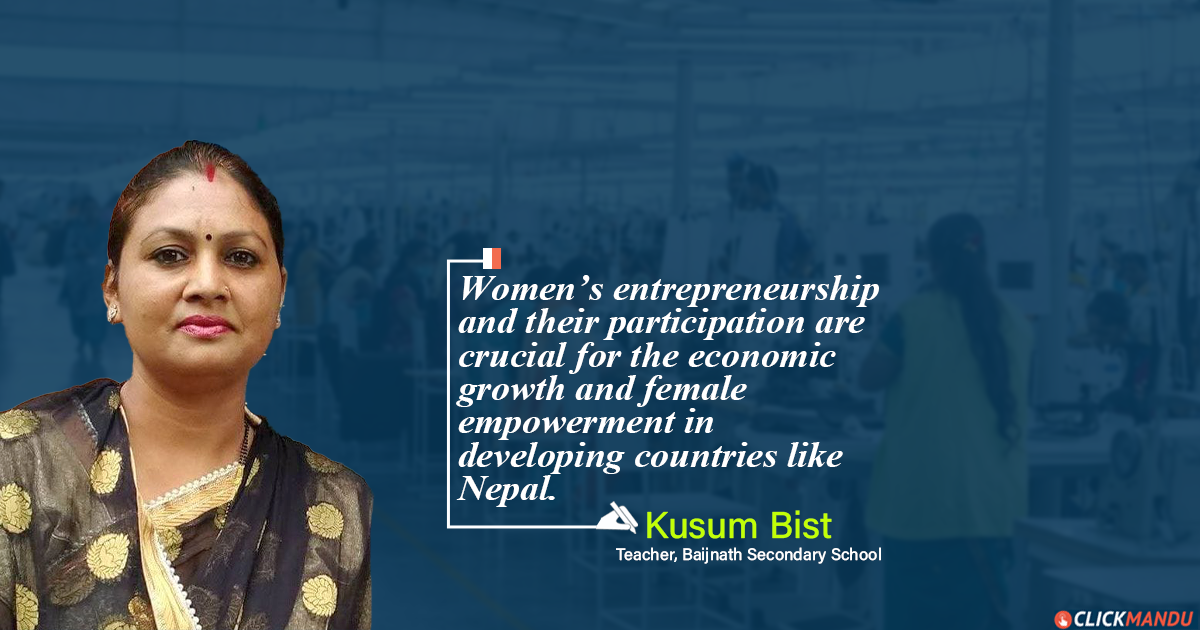Entrepreneurship is the process of creating, developing, and managing a new business with the aim of generating profits. An entrepreneur is an individual who takes financial risks to start and grow a business using innovative ideas and strategies. The slogan for International Women’s Day 2024, “Empower Women, Empower the World,” underscores the transformative potential of women entrepreneurs. Women in business have the power to drive societal change, particularly in management and leadership. Women’s empowerment has become a crucial factor in national development, as it fosters opportunities for women to voice their ideas and contribute economically. Ultimately, women’s entrepreneurship benefits not only individuals but also society and the nation as a whole. To achieve broader societal empowerment, greater participation of women in business is essential.
Entrepreneurship plays a significant role in wealth creation and employment generation, making it a driving force for economic growth in both developed and developing nations. It stimulates capital formation, reduces unemployment and poverty, and paves the way for prosperity. However, Nepal remains an underdeveloped country in South Asia, heavily reliant on international aid and remittances. Due to its weak economic foundation, key sectors like agriculture, industry, and taxation struggle to sustain the national economy.
Women’s entrepreneurship refers to women organizing their own businesses, empowering themselves economically, and improving their social status. Despite persistent challenges, women entrepreneurs in Nepal have made significant contributions across various economic sectors. Given Nepal’s economic struggles, women’s entrepreneurship can play a pivotal role in fostering growth. Historically, Nepali women have faced social and economic barriers in a male-dominated society. While progress has been made in recent years—such as improved access to education and political representation—significant disparities persist, especially in rural areas. Traditional norms often restrict women’s opportunities, pushing many into low-paying jobs and perpetuating the gender wage gap.
Despite legal protections, gender-based discrimination and workplace harassment remain widespread. However, government and non-governmental initiatives—such as entrepreneurship training and financial support programs—are equipping women with the skills and resources needed for economic independence. Organizations like UNICEF and the World Bank recognize the importance of women’s entrepreneurship in achieving gender equality and sustainable development. Studies confirm that empowering women economically leads to broader societal benefits, including poverty reduction and economic resilience.
Women entrepreneurs in Nepal have made progress despite challenges such as limited access to finance, cultural barriers, and scarce opportunities. Efforts by the government, NGOs, and international organizations have promoted women’s participation in business since the 1980s. Nepal’s first recognized woman entrepreneur, Hajuri Bista, began with a pickle business. Today, various programs—such as microenterprise development and income-generation initiatives—support women’s economic upliftment. The government has adopted policies to alleviate poverty through entrepreneurship, encouraging workforce expansion and women’s inclusion. These efforts help utilize local resources, meet consumer demand, and diversify markets through innovation.
Women bring multidimensional skills to entrepreneurship, fostering employment generation, global competitiveness, innovation, community development, and inclusive growth. Their participation is crucial for economic growth and female empowerment in developing countries like Nepal. Governments at all levels support women entrepreneurs to boost economic growth and increase tax revenue. Women’s participation in the economy is vital for sustainable development and resilience against financial crises. Nepal, like many developing nations, faces economic instability due to political uncertainty, geopolitical tensions, and investment insecurity. This is particularly evident in Kanchanpur District, where this study was conducted.
As Robert Hisrich notes, in rural areas with few industries, self-employment becomes a key driver of job creation. Kanchanpur, which suffers from migration and unemployment, can benefit significantly from entrepreneurial development. Entrepreneurship enhances women’s self-confidence, financial independence, and social standing. Ghanshyam Bhatta’s research highlights two key contributions of women entrepreneurs: economic growth through capital formation, increased income, and job creation, as well as social progress via regional development, improved living standards, and innovation.
My study examines how women’s entrepreneurship transforms personal lifestyles and impacts Kanchanpur’s economy. Located in Sudurpaschim Pradesh, Kanchanpur consists of seven municipalities and two rural municipalities. Historically, women in Kanchanpur faced socioeconomic disparities, including limited access to education, healthcare, and economic opportunities. However, recent empowerment programs have begun to change this. Agriculture remains the primary occupation, supplemented by small-scale manufacturing and timber industries. According to the Department of Cottage and Small Industries, Kanchanpur has 11,520 micro and small enterprises, with 4,835 women entrepreneurs and 7,142 male entrepreneurs in the fiscal year 2023/24. Additionally, 98 women-led programs were operational in the same period. Many women-run businesses remain unregistered, indicating even greater informal contributions. Financial institutions, cooperatives, and local governments have provided loans, encouraging women to start businesses and create employment.
There is a direct correlation between women’s entrepreneurship, economic growth, and poverty reduction. Despite progress, transitioning from homemakers to entrepreneurs remains challenging for women. Success requires creativity, resilience, and strategic planning. This study finds that women entrepreneurs in Kanchanpur have successfully achieved financial independence, improved their socioeconomic status, overcome traditional barriers, created local employment opportunities, and enhanced education and decision-making power. Entrepreneurship empowers women to explore their potential, innovate, and transform their lives. It also fosters a more equitable and inclusive society by narrowing the gender gap.
In conclusion, women’s entrepreneurship is a powerful tool for economic development and gender equality in Nepal. Despite challenges, women in Kanchanpur have demonstrated that with the right support, they can drive meaningful change—both for themselves and their communities. By investing in women’s economic participation, Nepal can unlock greater prosperity, social progress, and sustainable development.
The writer teaches Baijnath Secondary School, Mahendranagar. She can be reached at [email protected]



Comment Here